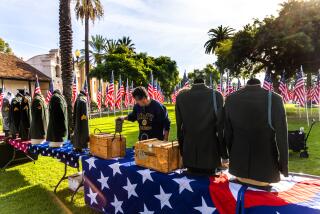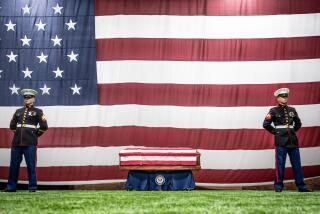Tough, Proud Army Ranger Is Mourned
- Share via
CHEYENNE, Wyo. — Even in this military town, where children are steeped in patriotism, Jonn Edmunds was singular in his commitment to serve his country.
On Monday, his family somberly gathered on their gravel driveway, braving a chilly fall wind, and remembered him as they said he would have wanted to be remembered.
“He was extremely proud of his achievements, as was the rest of his family,” said his father, Donn Edmunds, reading from a prepared statement, his voice growing stronger with every word. “He was a tough, determined, competitive young man who only accepted the best of himself, and wanted to give his best for his country.”
And that is how Edmunds died, a proud Army Ranger, one of the first three U.S. casualties in a war halfway around the world.
Edmunds, 20, and another Ranger, Pfc. Kristofer T. Stonesifer, 28, of Missoula, Mont., were killed Friday when their Black Hawk helicopter crashed in Pakistan as U.S. troops launched their first ground operations in neighboring Afghanistan, targeting the Taliban and Osama bin Laden’s Al Qaeda terror network. The cause of the crash remained unclear.
Air Force Master Sgt. Evander Andrews, 36, was the first U.S. casualty of the conflict when he was killed Oct. 10 in an airstrip construction accident in Qatar in the Persian Gulf.
Stonesifer was remembered as a proud and gung-ho soldier from a military family. Although his parents in Doylestown, Pa., declined to comment Monday, his father’s fiancee said Stonesifer was “an adventurer.”
“Kris could tell you which ants to eat and which roots and herbs to eat, too,” Roberta Diamond said.
Both soldiers would have had precisely such training as Rangers, which is the Army’s elite special operations force. In the course of their intensive training--which includes parachute jumping--Rangers learn survival skills, advanced hand-to-hand combat techniques and are adept at operating behind enemy lines with little support.
Both men were assigned to the 75th Ranger Regiment stationed at Ft. Benning, Ga.
Edmunds’ family and those here who knew him said there was little mystery to his life’s passion.
“No one doubted that Jonn had an agenda,” said Wayne Korhonen, who taught Edmunds psychology in his senior year at East High School. “He was going to enlist in the Army and he was going to become a Ranger. That was it.”
Edmunds was remembered in his hometown Monday with terms that were crisply military: focused, unwavering, dedicated. He doggedly played soccer even though he lacked an athlete’s easy grace. He borrowed books from his American history teacher for extra study. When a test was returned--even with an A grade--he fretted over answers he missed.
He could be persnickety about punctuality: Edmunds scolded Edith Russell, a counselor, whenever she arrived late. When he engaged in chess club matches during school, Edmunds refused to quit a game in progress and often asked that he and his opponent be allowed to continue, even as the next class of students settled in.
At East High, his alma mater, a brief memorial was held Monday morning for the 1999 honors graduate. Like Edmunds, many seniors join the military, and the town’s three high schools all have ROTC programs.
Cheyenne is the home of Warren Air Force Base, just a few miles from East High. The 90th Space Wing is based at Warren and is the nation’s largest strategic missile unit, which maintains Minuteman and Peacekeeper intercontinental ballistic missiles.
With 3,600 military personnel, 3,500 military family members and 1,500 military retirees--Cheyenne’s population of 55,000 is profoundly influenced by the armed services.
East High teacher Tim Woodard said graduates are drawn to military service because of family tradition and Wyoming’s bleak economy. “Then there’s the travel. We’re not backward, but this is still a rural community,” Woodard said. “They see the service as a way to get out of Wyoming.”
Principal Sam Mirich, who led the school in the pledge of allegiance, said Edmunds’ death made him rethink patriotic rituals. The pledge, for example, is recited only once a week.
“It will be every day now,” Mirich said. “At least for a while.”
Later Monday, family members walked out of their modest ranch-style home and stoically faced a throng of reporters. They were flanked by military officers and a large, formal portrait of Edmunds in his Ranger fatigues.
Standing silently beside Donn Edmunds was his wife, Mary, and their two other children--Seth, a high school junior, and Alyssa, an eighth-grader. Edmunds’ widow, Anne, was believed to be headed here from the couple’s home at Ft. Benning.
Donn Edmunds, an Army veteran who now operates a local security firm, spoke for them all, briefly and succinctly.
“During this time of our tragic loss, our family’s thoughts are also with the Stonesifer family in Montana, and all the other troops engaged in Operation Enduring Freedom. Even in this time of loss, our family wants to express our continued support for our president and his policies regarding the actions in Operation Enduring Freedom.”
By all accounts, Edmunds died doing what he loved. Scores of young men in this region aspire to join the armed forces--”Rangers, SEALs, whatever the current movie is,” one teacher said.
Edmunds eschewed the clutter of teenage life, neither joining clubs nor agonizing about being popular. Of average height and strong but slightly built, Edmunds kept his dark hair closely cut and was always neatly dressed.
“Lots of kids around here talk about going Special Ops and that sort of thing,” said Mike Belomyzy, who coached Edmunds in intramural sports. “But with Jonn, you absolutely believed it would happen. He had some major drive that he got from somewhere.”
Edmunds enlisted in July 1999 and joined the Rangers five months later, achieving the rank of specialist 4. When he returned here last spring to visit, he told his former teachers he was loving his job.
“I could see him growing, a growing sense of himself,” said Dennis Coelho, who taught Edmunds American history. “He was becoming someone who could and would have wanted to take responsibility for himself and others. I think that’s what he liked.”
More to Read
Sign up for Essential California
The most important California stories and recommendations in your inbox every morning.
You may occasionally receive promotional content from the Los Angeles Times.














